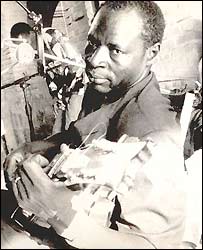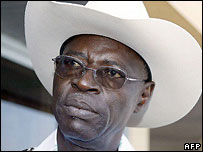
Ali Farka Toure refused to go into exile (Pic: World Circuit Records)
|
Ali Farka Toure, known as the "Bluesman of Africa", who has died of cancer, was one of the continent's best known musicians.
Outside his home country of Mali, he was seen as blending African music with the blues of the southern United States and he collaborated with US stars Ry Cooder and John Lee Hooker.
At his house in the capital, Bamako, a photo of a young Toure next to US rock star Jimi Hendrix was always proudly on display.
Despite these influences and the cowboy hat he generally wore when performing, he always insisted that the music he played was authentically African, as were the origins of blues.
His first instrument was the traditional Malian string instrument, the gurkel, but he later switched to the guitar.
The haunting music he played though, stayed the same - conjuring up the slow movements of the River Niger as it sweeps through the Sahara desert near his home town of Niafunke.
 |
 We would have dinner with him, and listen to him share his experiences, always with a laugh and smile
We would have dinner with him, and listen to him share his experiences, always with a laugh and smile

|
He worked as a docker in Niafunke for the boats plying the River Niger before moving to the capital, Bamako to become a driver for Mali's national radio and television company, ORTM.
But he always said ORTM refused to give him his big break by not backing his first album.
Toure always said he owed his career to the BBC, which gave him his first international exposure in the 1980s, says Malian journalist Sadio Kante.
Bleak environment
Unlike many African music stars, he rejected the call of the bright lights of Paris, London or New York and always lived in Mali.
When he won his first Grammy award, he even refused to travel to the United States to collect his prize, saying:
"I don't know what a Grammy means but if someone has something for me, they can come and give it to me here in Niafunke, where I was singing when nobody knew me."
He then threw himself into farming, fishing and raising cattle in his home town.
Later, he became mayor of Niafunke in a bid to use some of his wealth and international connections for the good of his people.
Sadio Kante says he was a generous man and later did his best to help launch Mali's next generation of artists.
He was born in 1939 in the historic town of Timbuktu on the edge of the desert and tried to bring together the various communities who inhabit this bleak environment.
While the Tuareg and Toure's Songhai people were at war in the 1990s, Toure sang in both their languages, as well as Fulani - another language of northern Mali.
However, his appeal was largely limited to northern Mali and western blues fans.

He generally performed in a cowboy hat
|
Younger residents of southern Mali and the capital, Bamako, are more likely to appreciate the latest US rap releases than his most famous albums, Talking Timbuktu and In the Heart of the Moon, which won Toure his two Grammy awards, respectively in 1994 and earlier this year.
In the Heart of the Moon was a collaboration with another famous Malian musician, Toumani Diabate.
However, only Diabate was able to go to a special reception laid on by President Amadou Toumani Toure in their honour.
Toure the musician was already on his death bed, battling cancer.
He leaves a widow and 11 children.
His record label, World Circuit, however, says that he had just finished work on a new solo album so his final musical legacy is still to be heard.
